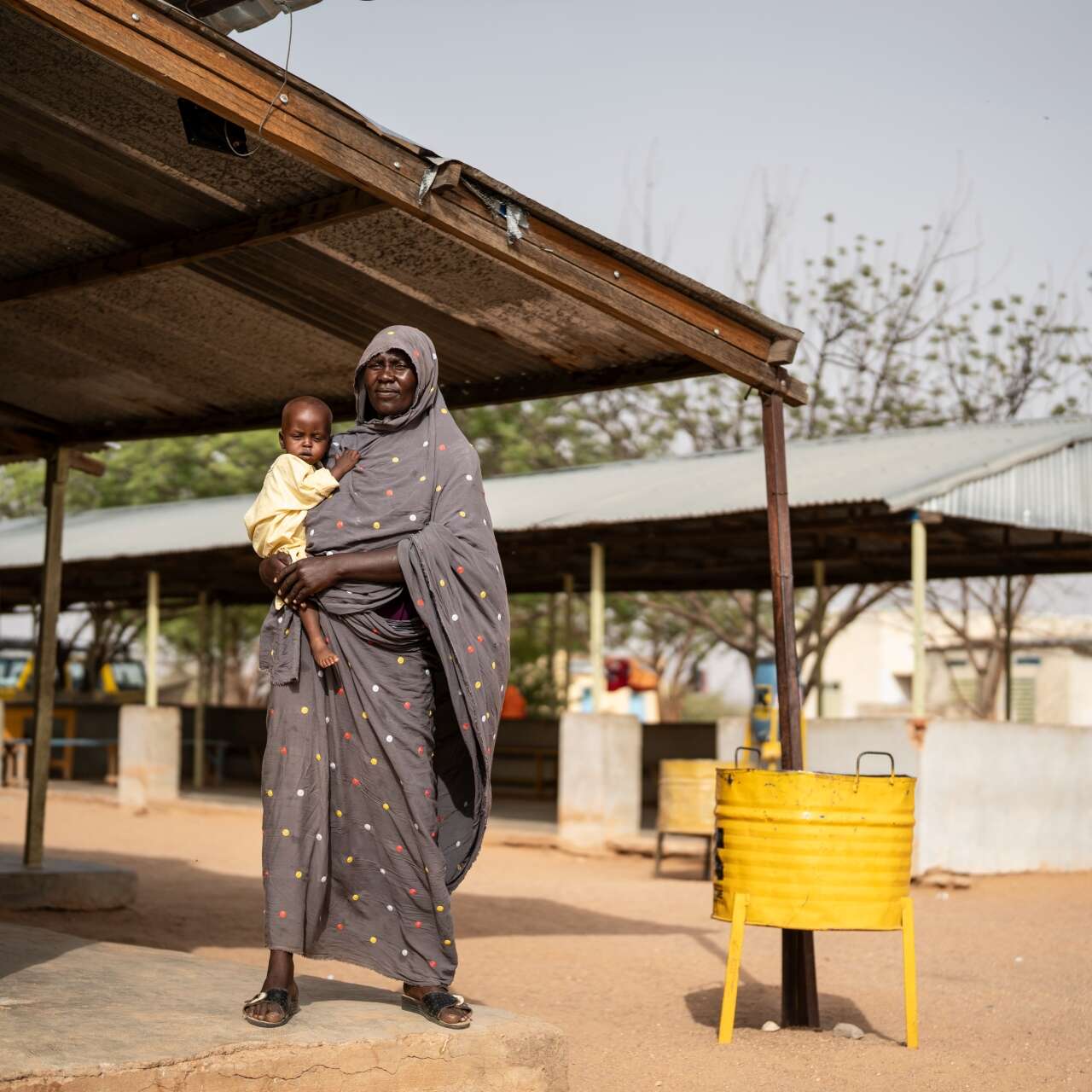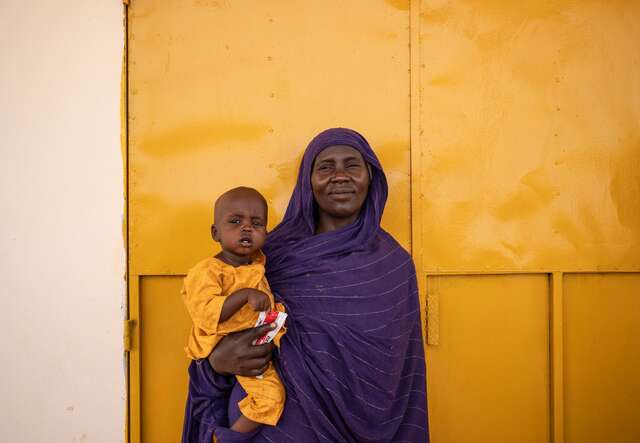
Stories from Sudan: The largest humanitarian crisis on record
Amidst a brutal civil war, three powerful stories of courage and compassion emerge.

Amidst a brutal civil war, three powerful stories of courage and compassion emerge.
Two years of brutal civil war have created a humanitarian catastrophe in Sudan. More than 12 million people have been forced from their homes, the health care system has collapsed and famine is spreading across the country. Gender-based violence is rising.
Sudan is now the largest humanitarian crisis ever recorded. It is also the largest and fastest displacement crisis on record.
International Rescue Committee (IRC) teams are on the ground in Sudan and in neighboring countries where refugees are arriving, responding to the immediate needs of war-stricken communities.
These are the real stories of survivors, aid workers and everyday heroes risking everything to save lives.
Civil war erupted in Sudan on April 15, 2023, and 2 years later, the violence shows no signs of stopping. Over 12 million people have been displaced within Sudan and across borders to neighboring countries.
Sudan's humanitarian crisis is the largest on record. More than 30.4 million people in urgent need due to famine, human rights violations and attacks on aid workers.
Amid the violence, hunger and loss in Sudan, three brave women have shown incredible strength and selflessness, risking everything to protect their loved ones. Their stories reveal the heartbreaking reality of Sudan’s humanitarian crisis and the vital work being done by organizations like the IRC to help.
Over 20 years ago, war forced Khamissa to flee her home in Darfur, Sudan for a refugee camp in neighboring Chad. Years later, one of her daughters returned to Sudan to raise her own family.
But when Sudan’s civil war erupted, tragedy struck. Khamissa’s daughter and eleven-year-old granddaughter were killed, leaving behind four of Khamissa’s grandchildren.
At 70 years old, Khamissa embarked on a perilous journey: she traveled into Sudan on foot to rescue her orphaned grandchildren. For two days she walked to Al Geneina, Sudan where she found her grandchildren still alive. The youngest, Djaba, was just a baby, entirely dependent on his mother’s milk. Without her, he suffered from severe malnutrition.
“We treated him with great difficulty,” Khamissa recalls. Desperate to keep Djaba alive, she even tried to breastfeed him herself. “We tried with all our might to keep him alive.”
When the family returned to the refugee camp in Chad, Khamissa immediately took Djaba to the IRC’s health center for urgent care. Thanks to Khamissa and the IRC, Djaba’s health has improved significantly.
“The situation is really tough,” says Khamissa. “If the organization [the IRC] wasn't here, our situation would be much worse.”

When violent conflict erupted in Khartoum, Eatizaz Yousif—the IRC's Country Director in Sudan—was forced to flee with her team, but displacement didn't stop their work. Despite Sudan's worsening humanitarian situation, Eatizaz and her displaced staff immediately began organizing emergency response efforts from Al Jazirah State.
“At that time, there was no internet, no banking system,” Yousif recalls. “But despite that, we overcame all of the scaling.”
Adapting to dangerous and fragile conditions, Yousif has led her team through opening and closing various offices and deploying mobile medical teams to reach families with critical care.
“We are trying to reach whatever population we’re able to reach and to provide services despite all of the access issues that we are navigating,” she explains. “You’ll see our medical team moving all over, providing and distributing dignity kits and trying to create safe spaces for women and children.”
Eatizaz has been displaced three times and is separated from her family. She lives out of her suitcase, ready to move at a moment’s notice. “I count that I’ve slept in over 50 beds since the conflict started,” she says.
Despite the overwhelming challenges, she clings to hope—carrying her house key everywhere as a symbol of her belief that one day, she’ll return home with her family in peace.

Before the war, Safa lived a peaceful life in Sudan with her children, twin sister, nieces and nephews. “Life was very beautiful, we had everything we needed,” she says.
But everything changed when conflict broke out and her twin sister was killed. Safa had no choice but to run, bringing her sister’s children with her.
“We just ran with our children. When you run, you carry one child and others help carry the other [children],” Safa recalls.
The escape to neighboring Chad was terrifying. Safa and the children witnessed people being beaten and killed. “If the first group passes, they kill the second,” she says. “We changed direction if they killed like 100 or 200 in front of us. But we left in the morning and reached Adre [Chad] by sundown.”
In Adre, Safa was reunited with her mother and one surviving sister before the family relocated to the nearby Farchana refugee camp. Upon their arrival, Safa discovered that her nephew, Mountasse, was suffering from severe acute malnutrition.
He was hospitalized for 12 days at an IRC clinic in the camp.
“The situation was grave,” Safa shares. “I thank them a lot, the hospital and the doctors did their jobs with total devotion. Because when we brought this boy, he was very sick, we didn’t expect him to survive.”
Thanks to the IRC's emergency care, Mountasse was discharged. But life in the camp is still very hard. Every day, Safa walks to fetch water from communal taps. There isn’t enough food, and her family lives in two small rooms, sleeping on the floor without mattresses or mats.
Still, Safa holds on to hope. She dreams of peace in Sudan and a better life for her children, nephews and nieces.

The IRC is on the ground in Sudan and in neighboring countries receiving Sudanese refugees, despite incredible obstacles—including limited humanitarian access, the displacement of staff and escalating violence. We remain committed to delivering critical support to the people of Sudan.
We are delivering life-saving services to communities impacted by the civil war in Sudan. Our response meets emergency needs and provides sustained humanitarian assistance.
Our programming includes:
Following the outbreak of war in April 2023, the IRC established operations in Wad Madani, Al Jazirah State, where we provided health and nutrition services to displaced people fleeing Khartoum until security concerns forced the closure of our office and the relocation of staff.
Despite immense operational challenges, the IRC continues to provide support in Blue Nile, Gedaref, Khartoum, South Kordofan, River Nile and White Nile states. We also have a logistics and coordination office in Port Sudan and are exploring opportunities to expand our presence into other states.
Since the outbreak of civil war in April 2023, the IRC has scaled up our services in neighboring countries where more than 3 million refugees have fled. IRC teams are on the ground in South Sudan, Uganda, Chad and Ethiopia delivering emergency services.
We have scaled up our response, delivering clean water and mobile health programs to meet the needs of arriving refugees. In addition, the IRC offers education, economic support and a variety of health and hygiene programs to help refugees recover and rebuild their lives with dignity.
After two years of war, Sudan faces an unprecedented humanitarian disaster. Eatizaz Yousif and her team are delivering life-saving aid despite overwhelming challenges.
But they can’t do it alone.
Your donation today can help provide emergency medical care, nutrition support, clean water and safety to the millions of people suffering in Sudan and its neighboring countries. Together, we can make a real difference.
Learn more about how you can help the IRC continue our mission.
Get connected: Follow our Instagram, LinkedIn, Facebook, Bluesky and X accounts.